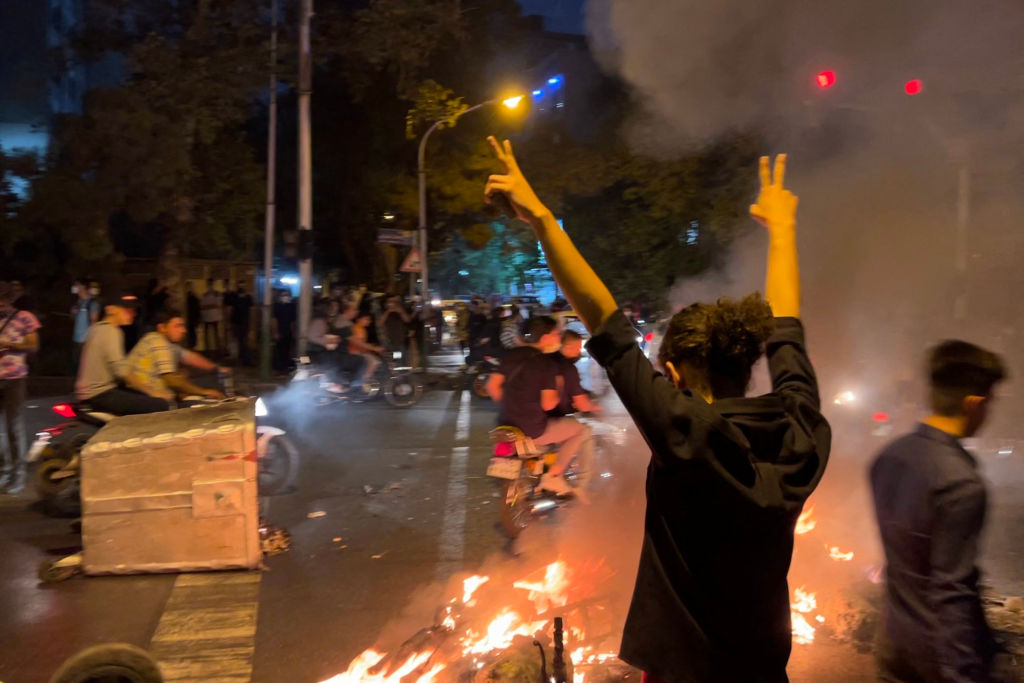Since November, thousands of Iranian students, the majority being girls, have been attacked with toxic gas in schools in cities like Qom and Tehran, with at least one girl allegedly having died as a result. Activists say the poisonous attacks have been deliberately carried out by hardline religious groups opposed to girls’ education in an attempt to force schools to shut.
BBC Research suggests that as of Sunday, at least 830 students had been victims of the poisonous attacks, while a Member of Parliament in Qom put the figure at 1,200 in Qom and Borujerd alone. Students in at least 26 schools across five cities have become targets, according to local media and activists.
The attacks follow months-long mass protests against the clerical Iranian regime, led by Iranian women and girls, that erupted after the death of 22-year-old Mahsa Amini, who died in the custody of the morality police over “improper hijab.”
The first attack took place in the religious city of Qom on November 30, with 18 students from the Nour Technical School taken to hospital. Many of the poisoned have suffered respiratory problems, nausea, dizziness, and fatigue, with social media posts showing some girls being hospitalized.
The Center for Human Rights in Iran has also alleged that at least one girl, 11-year-old Fatemeh Rezaei, died as a result of the attacks. Iranian journalist and children’s rights activist Hedie Kimiaee tweeted on Feb. 27 that Rezaei had died of gas poisoning at a school in Qom and that the Iranian authorities were trying to suppress information about the case.
Read More: Hundreds of Schoolgirls in Iran Have Been Targeted by Poison Attacks. Here’s What to Know
“Even though this student had no prior illness, the authorities are trying to write a false medical report saying she had a long history of illness,” Kimiaee wrote. “Qom’s prosecutor has also warned the family not to talk to the media [and told them to] bury Fatemeh without notice.”
Iranian authorities staunchly denied reports that Rezaei’s death was linked to the poisonings, according to the Washington, D.C.-based Iran International news channel.

Despite the outrage from Iranian citizens, authorities have so far responded with “contradictory explanations and appeared to downplay their seriousness,” Human Rights Watch stated.
Earlier this week, at a cabinet meeting in the capital of Tehran, Iran’s President Ebrahim Raisi instructed the Interior Minister Ahmad Vahidi to find the cause of the mysterious poisoning “as quickly as possible.” He urged the Ministries of Health and Information to provide assistance in investigating the matter. However, he attributed the symptoms to stress and anxiety over exams and accused international media outlets of “taking advantage” of the situation to cause public alarm.
At a news conference on Sunday, Deputy Health Minister Younes Panahi also acknowledged that the attacks may have been intended to prevent girls from going to school, according to Iranian state broadcaster IRIB. “What is clear is that both in Qom and Borujerd, it is a deliberate issue,” he said. He continued, “some people wanted all schools to be closed, especially girls’ schools.” However, Panahi later said his statement had been misunderstood.
The attacks have caused many panic-stricken students to stay home. According to local reports, fearful parents have begun pulling their children out of class as a precautionary measure, while many are gathering outside schools to protest. According to a BBC report, in one viral video, a father is seen shouting outside the Qom governor’s office, “You are obliged to ensure my children’s safety! I have two daughters and all I can do is not let them go to school.” In another video, worried and angry parents are seen demanding action in front of Yarjani Primary School in Narmak.
On March 1, the Iranian Teachers’ Trade Association issued a statement calling on Iran’s Supreme Leader and senior officials to condemn the attacks and protect students. “It is necessary for the responsible institutions to immediately implement several measures without wasting more time,” it said. It further asked the judicial authorities and the education minister to explain how they would be investigating the attacks.
“We need the international community to condemn this biological attack immediately and take strong action,” Masih Alinejad, a notable Iranian journalist and activist, posted on Twitter.
More Must-Reads from TIME
- Inside Elon Musk’s War on Washington
- Meet the 2025 Women of the Year
- The Harsh Truth About Disability Inclusion
- Why Do More Young Adults Have Cancer?
- Colman Domingo Leads With Radical Love
- How to Get Better at Doing Things Alone
- Cecily Strong on Goober the Clown
- Column: The Rise of America’s Broligarchy
Write to Astha Rajvanshi at astha.rajvanshi@time.com